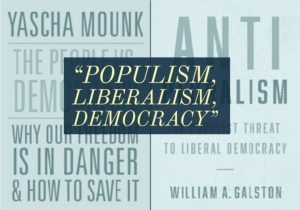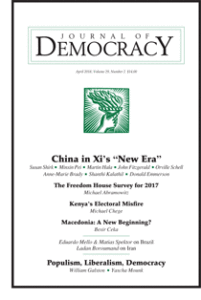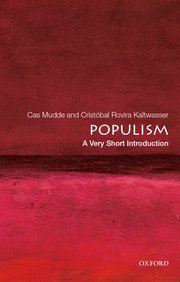 While democracy may be widely admired, it is, in its liberal form, an embattled ideology, according to James Miller, author of Can Democracy Work? As the social scientist William Galston has sharply observed: “Few leaders and movements in the west dare to challenge the idea of democracy itself. Not so for liberalism, which has come under mounting attack.” One result has been the rise of popular movements in which a majority of ordinary citizens has embraced a narrow conception of solidarity and rallied around a leader who claims to embody the will of such a closed community, he writes for The Guardian:
While democracy may be widely admired, it is, in its liberal form, an embattled ideology, according to James Miller, author of Can Democracy Work? As the social scientist William Galston has sharply observed: “Few leaders and movements in the west dare to challenge the idea of democracy itself. Not so for liberalism, which has come under mounting attack.” One result has been the rise of popular movements in which a majority of ordinary citizens has embraced a narrow conception of solidarity and rallied around a leader who claims to embody the will of such a closed community, he writes for The Guardian:
So it is perhaps not surprising that our world has also witnessed, in virtually every country, poor or developed, socialist or communist, autocratic or liberal, a fitful, sometimes futile series of popular uprisings and protests, when crowds of ordinary people unite to demand a fairer share of the common wealth – and to claim for themselves a larger share in more truly democratic institutions. These revolts against remote elites are essential to the vitality, and viability, of modern democracy – even as (and precisely because) they challenge the status quo, destructive though that challenge may be.
Democracy’s Ugly Brother?
 A revisionist view of populism is echoed by Werner J. Patzelt, a professor of political science at Dresden Technical University and one of the few European intellectuals willing to admit that “the established political-media class often refer to people as ‘populists’ who frustrate them due to their style of behavior, or because of their political positions,” notes Martha Bayles, author of Through a Screen Darkly: Popular Culture, Public Diplomacy, and America’s Image Abroad (Yale 2014), and a visiting fellow at the Hudson Institute.
A revisionist view of populism is echoed by Werner J. Patzelt, a professor of political science at Dresden Technical University and one of the few European intellectuals willing to admit that “the established political-media class often refer to people as ‘populists’ who frustrate them due to their style of behavior, or because of their political positions,” notes Martha Bayles, author of Through a Screen Darkly: Popular Culture, Public Diplomacy, and America’s Image Abroad (Yale 2014), and a visiting fellow at the Hudson Institute.
In a recent essay – “Populism—and How To Handle It,” in Populism as a Common Challenge (Konrad Adenauer Stiftung) – Patzelt interprets the populist surge in Europe as a “warning signal” that a dangerous “gap of representation” has opened between “a significant part of the population” and “their elected politicians,” she writes for The American Interest.
 Describing populism as “the ‘ugly brother’ of a beautiful girl named ‘democracy,’” he lists its four key elements:
Describing populism as “the ‘ugly brother’ of a beautiful girl named ‘democracy,’” he lists its four key elements:
- Demagogic Simplification. When a dumbed-down version of reality is used not to educate people but to manipulate them.
- Selfish Political Entrepreneurship.When elected officials seek mainly to enhance their own power and partake of its spoils.
- Anti-Representative Confrontation of “Below” and “Above.” When politicians display seeming contempt for voters, and voters come to reject not just particular officeholders but the basic principles of representative democracy.
- Assertion of a Clear and Uniform “Will of the People.”When one party or leader persuades one part of the population that they are the only part that counts.







